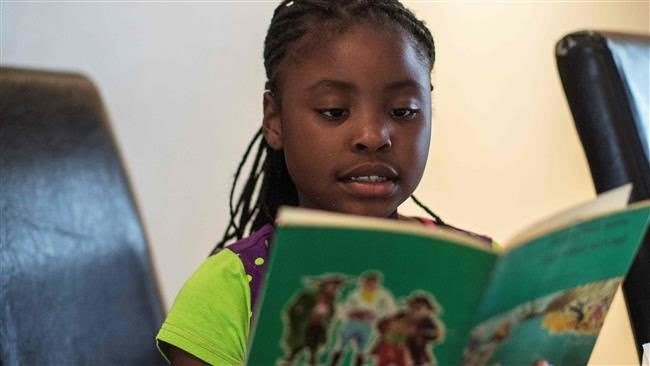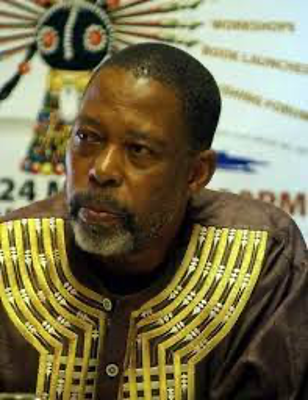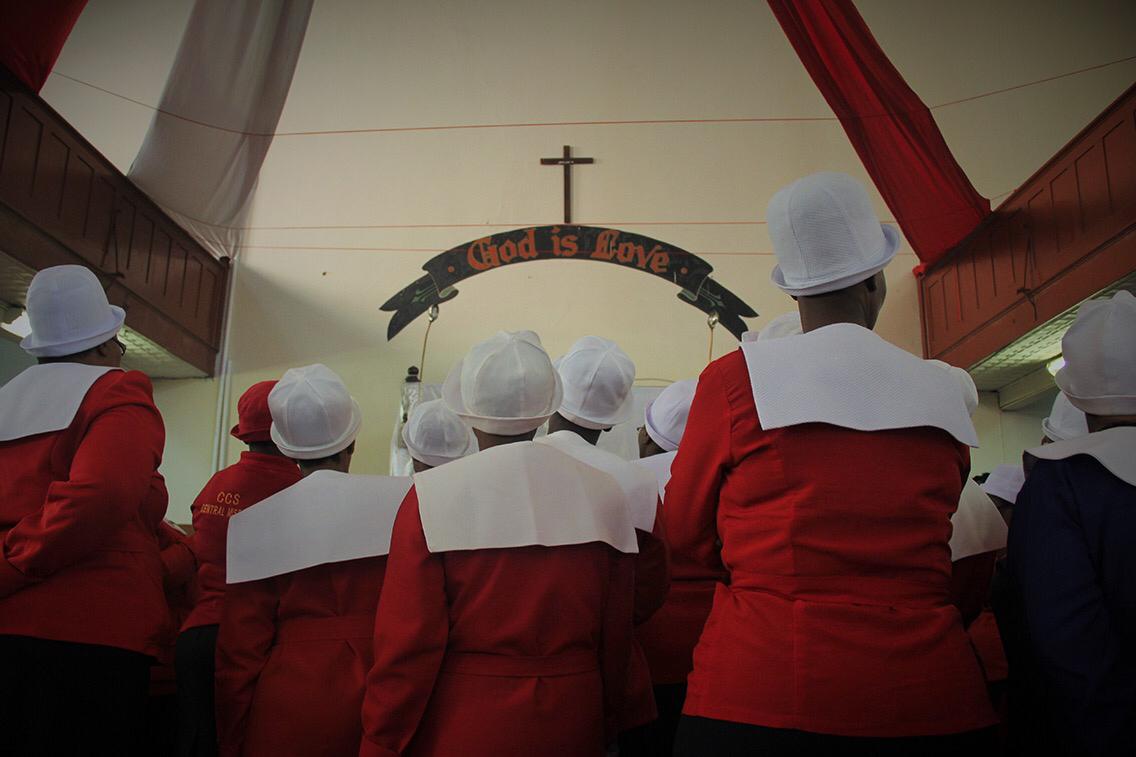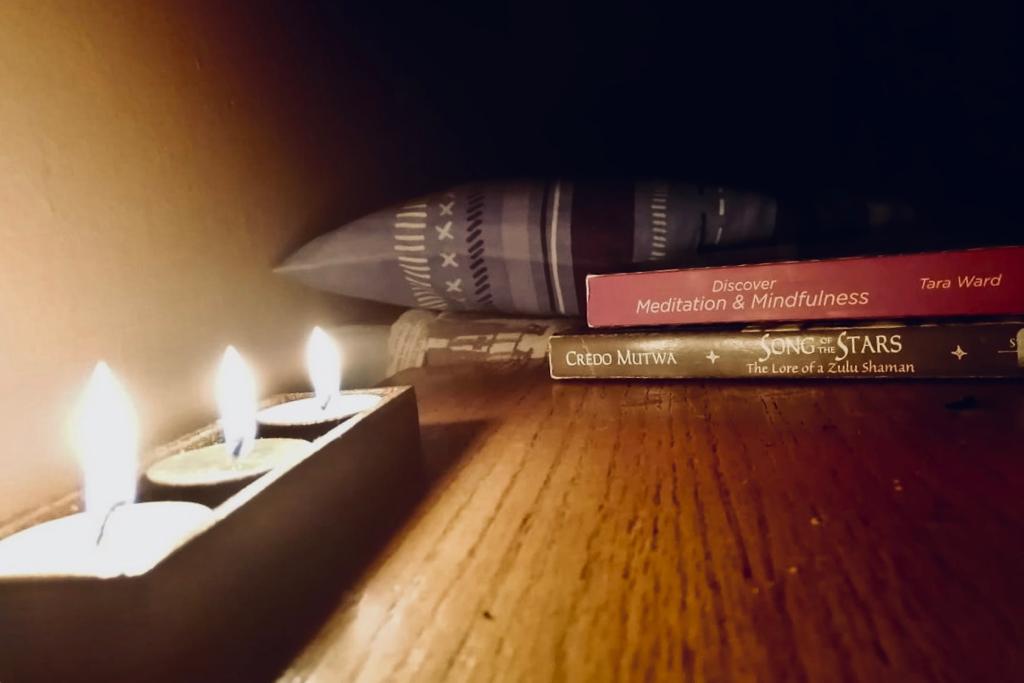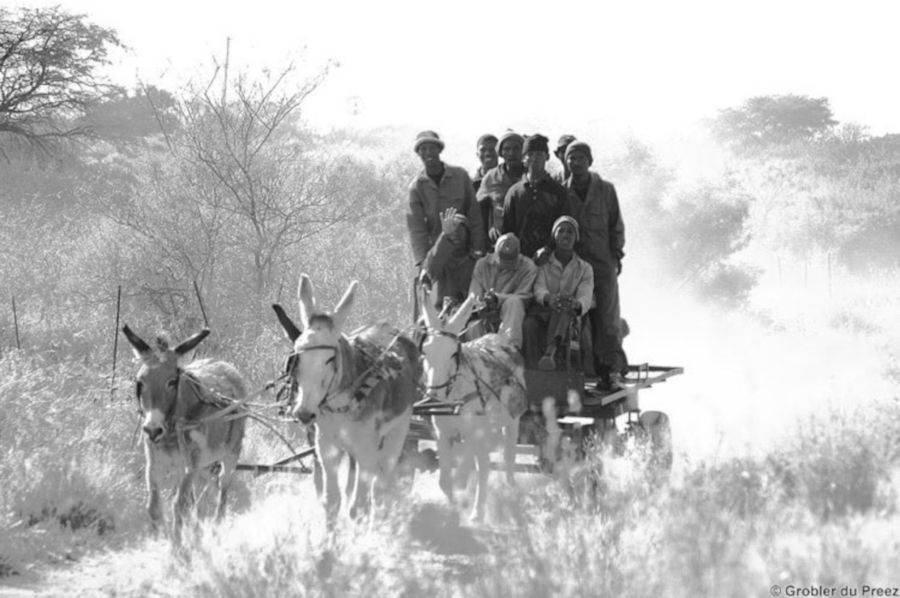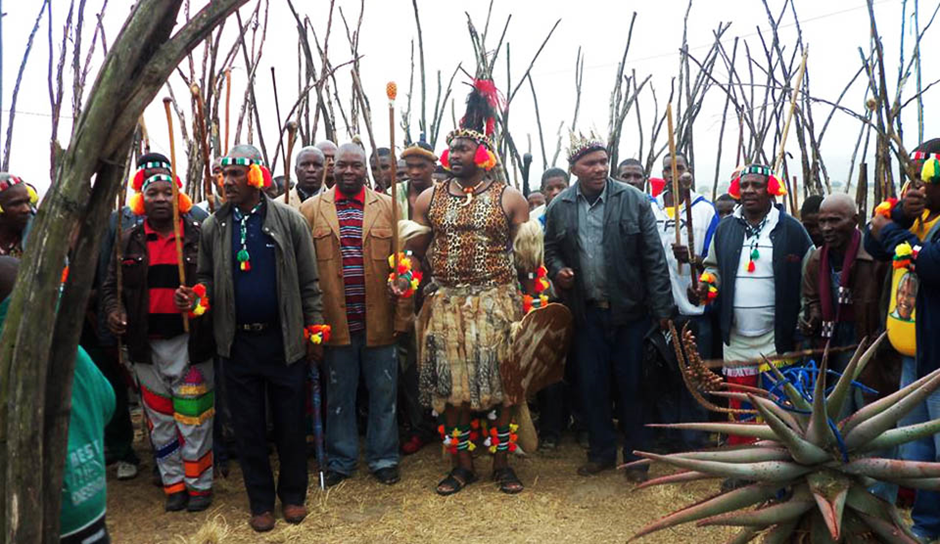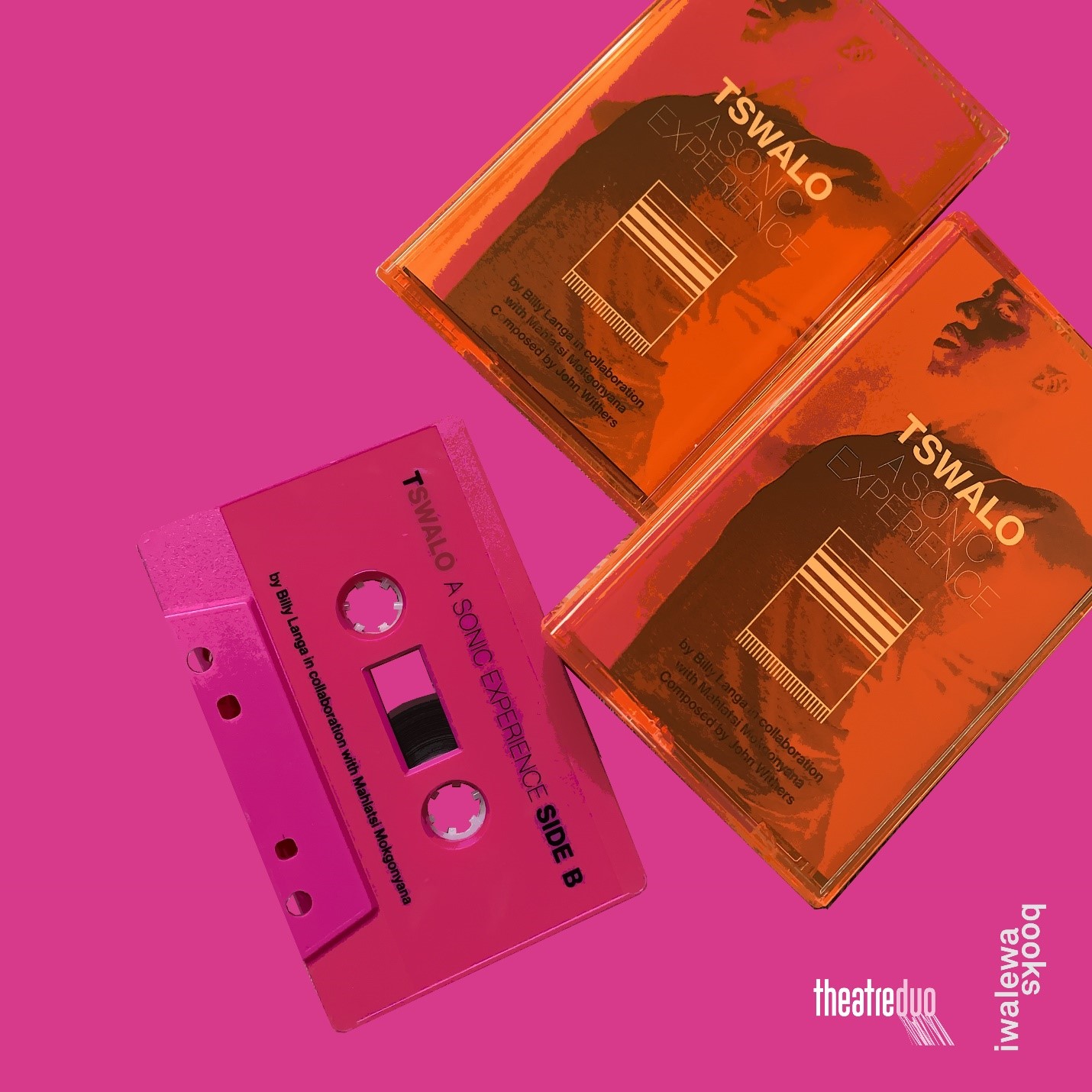PICTURED: Es’kia Mphahlele & Artistic Director at The Market Theatre, James Ngcobo
The memory of Professor Ezekiel Letoba Mazwi Mphahlele (1919-2008) or ‘Es’kia’ or ‘Zeke’ was rekindled, throughout February 2021, at ‘The Market Theatre’ in Newtown, Gauteng. Origin of the nickname ‘Zeke’ remains elusive to me, unlike that of ‘Es’kia’. After almost two decades (1959-1977) in self-exile, in defiance of the Apartheid regime, after arriving back in South Africa, what Mphahlele called ‘the tyranny of place’ in 1977, he decolonised his name, from the biblically derived Hebrew name of ‘Ezekiel’, to ‘Es’kia’. The latter, embraced his Africanism. The latter decision is prudently recorded in Mphahlele’s last interview (published in the now defunct South African literary journal titled Wordsetc) to journalist Madala Thepa. Mphahlele argued that “Es’kia is Sotho...So in Sotho the short name or shortcut to Ezekiel is Es’kia” (Thepa, 2008:20).
Contextually when fast-forwarding from past showcases, hosted at The Market Theatre, the dual displays of art discussed here, ought to be read, as the latest homage of Mphahlele’s life and his oeuvre at this venue. Prior shows mainly include adaptations of Mphahlele’s The Suitcase in 2005 (followed up elsewhere in 2005 with amid others, a five week sold out England tour in Hull, Lancaster, Newcastle, Liverpool and Derby), returning to The Market Theatre in 2007 and in 2017. Observably, all the aforesaid were directed by James Ngcobo, the current Artistic Director of The Market Theatre, appointed in this post in 2013.
Ngcobo’s adaptation was meant to honour Mphahlele as South Africa’s globally acclaimed ‘doyen of Arts and Culture’ or ‘Dean of African letters’. The latter is a fond reference, by scholar-activist protégés of Mphahlele, such as Professors Muxe Nkonde, Njabulo Ndebele, Peter Thuynsma and Sam Raditlalo. In brief, The Market Theatre dually hosted from 21 - 28 February 2021, The Amazwi Mphahlele Exhibition alongside a theatre adaptation, directed by Clive Mathibe of one of Mphahlele’s arguably lesser fêted texts, Father Come Home/Tate Etla Gae, which ran from 9 - 28 February 2021. For an apt appreciation of the latter, an evanescent background follows.
About Amazwi
The Chairperson of Council of Amazwi South African Museum of Literature, Sanele Nhlabatsi, reported in the Amazwi South African Museum of Literature Strategic Plan 2020-2025, that, “The National English Literary Museum [NELM] was renamed Amazwi South African Museum of Literature (Amazwi) by Minister of Arts and Culture [Nkosinathi Mthethwa] on 19 March 2019 (Government Gazette, 12 April 2019, Notice Number 566)” (Nhlabatsi, 2020:2).
Amazwi’s ‘mission statement’ reads as follows, “To preserve the literary heritage of South Africa, promote its narrative to the world, and foster a culture of reading, writing and storytelling for education and enjoyment” (Amazwi Strategic Plan, 2020:6). So Minister Mthetwa’s aforesaid decision confirmed Amazwi as an agency of ‘Department of Arts and Culture’ (DAC). Subsequently however, it later transpired that on the 14th of June 2019, President Cyril Ramaphosa, announced reconfigurements of South Africa’s government departments. DAC for one, was merged with the ‘Department of Sport and Recreation’, becoming the ‘Department of Sports, Arts, and Culture’ (DSAC). Nkosinathi Mthethwa was announced as Minister of the new DSAC.
Amazwi is derived from indigenous Nguni languages of South Africa, such as isiXhosa and isiZulu and means ‘voices’ / ‘words’. This name change is based on the linguistic and cultural inclusivity, as per Amazwi’s new mandate, to promote and preserve vital South African literary works, authored in English and all of South Africa’s recognized indigenous languages. Amazwi inherited NELM’s two satellite institutions, The Eastern Star Gallery Printing and Press Museum and Schreiner House, in Cradock. Historically NELM was founded by Professor Fredrick Guy Butler (1918-2001) in 1972, in Grahamstown, Eastern Cape Province, while ‘Head of English Department’, at Rhodes University. Grahamstown was renamed, after ‘Gazette no. 641 of 29 June 2018’, which paved the path for the 2nd of October 2018, to become the official date, to use Makhanda. Makhanda or Makana ka Nxele, is a descendant of the Khoikhoi and Xhosa people. He was a prophet and warrior. For the DSAC, all name changes are meant to serve as ongoing efforts of ‘symbolic reparations’, resulting from South Africa’s unjust past.
Amazwi Mphahlele Exhibition and Clive Mathibe’s adaptation of Tate Etla Gae
This Amazwi Mphahlele Exhibition, vis-à-vis Mphahlele’s life and his oeuvre is one of the latest. Past exhibitions include NELM’s Es’kia Mphahlele Exhibition (2009) in Makhanda, Es’kia Centenary Show (2019) at Polokwane Art Museum, The Afrikan (Literature) Image Funda uFundise Book Exhibition (2019), hosted by Funda Community College, in Jabavu, Soweto and Es’kia Mphahlele Exhibition-Man of Letter’ (launched at AMAZWI PUKU Story Festival 2020) in Makhanda. This Amazwi Mphahlele Exhibition was displayed in The Market Theatre’s The Mannie Manim Foyer. The Master of Ceremony Bekie Ntini (Manager of Training and Public Engagement Programs for the Market Theatre Photo Workshop) called two speakers afore, James Ngcobo (Artistic Director) and Clive Mathibe (Director of the adaptation of Father Come Home/Tate Etla Gae, while the third was an audio message on behalf of Amazwi. The latter audio message, basically summed up Amazwi’s ongoing vow, to publicize Mphahlele’s works.
The first to speak was James Ngcobo and his opening message reminisced about the earlier stated theatre shows he directed of Mphahlele’s The Suitcase. Ngcobo highlighted his joy at meeting Mphahlele in 2005 at The Market Theatre and also the former United Nations Secretary-General Kofi Anan (1938-2018) at ‘Hull Truck Theatre’ in Hull, Yorkshire, UK in 2017. Ngcobo ended his address with an emphasis to increase engagement of our local art works through our indigenous languages.
He thus announced a planned partnership with the Johannesburg Institute of Advanced Study (JIAS), headed by Dr. Bongani Ngqulunga, with the aim of publishing the Sepedi translation of Father Come Home/Tate Etla Gae, as authored by Rami Chuene. The second speaker, Clive Mathibe, greeted the audience by proudly declaring that he hailed from ha Mphahlele. Mathibe explained that his adaptation of Tate Etla Gae was proudly drawn from Chuene’s Sepedi translation of Mphahlele’s Father Come Home.




